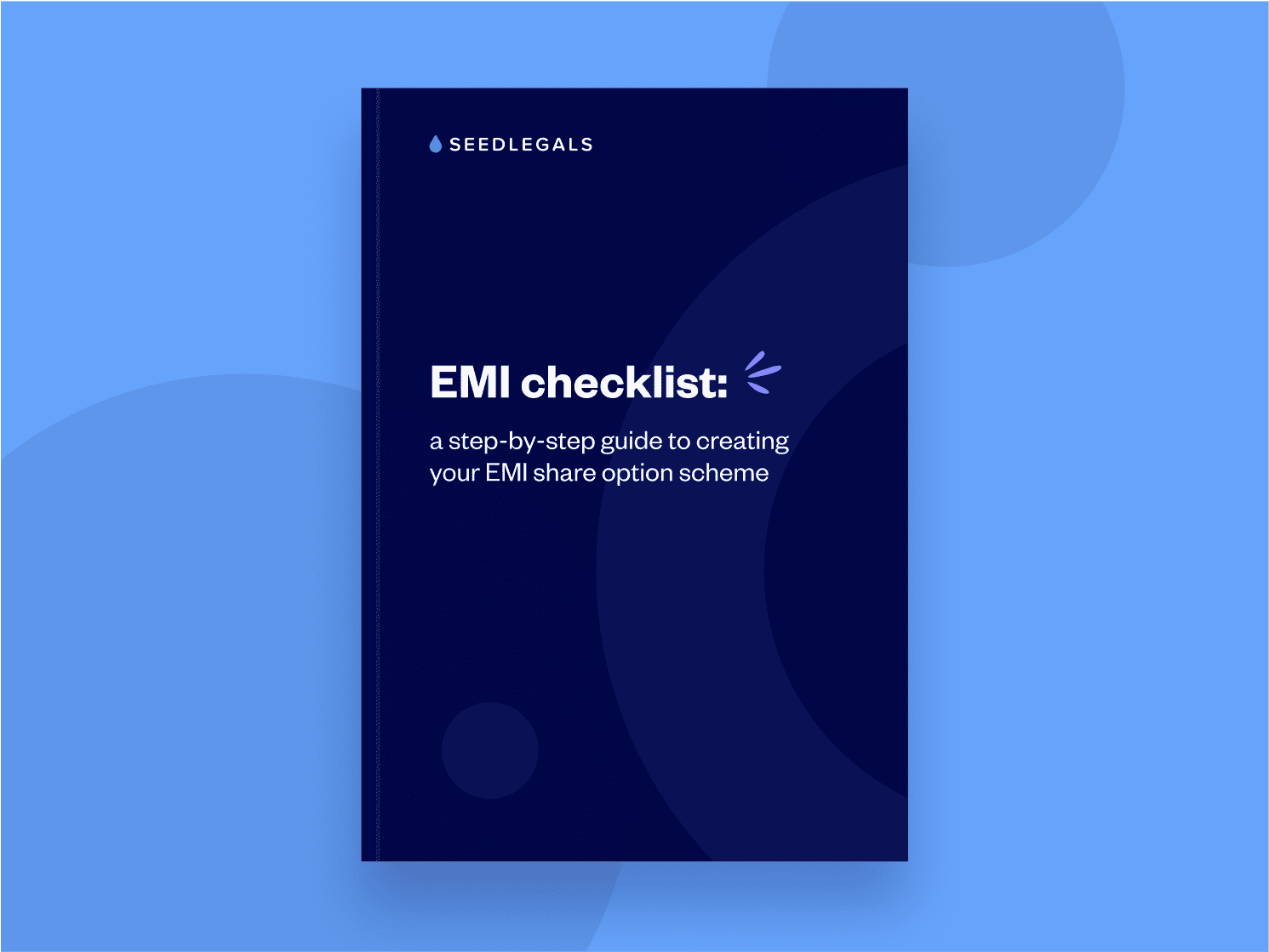Share options explained: the essential guide for UK startups
Want to offer your team equity in your company? Our guide covers the facts about share options: how and when to set up a...


Want to attract and motivate top employees? EMI share options are the way to go.
An EMI share option scheme is a way to distribute tax-advantaged share options to full-time employees. Because EMI share options get such favourable tax treatment, they’re the preferred way for companies to grant equity to employees, and give them a personal stake in the company they’re helping to build.
In this article, we’ll cover what the EMI scheme qualifying criteria are for your company and employees.
Contents:
We make it fast, easy and affordable to create and run an EMI scheme. Create documents in just a few clicks.

Your company won’t qualify for EMI if you carry out one or more of the following excluded trading activities:
Source: Gov.uk Employee Tax-advantaged Share Scheme User Manual
To qualify as a UK establishment, your company must have either:
If the company granting share options is a parent company, at least one company in the group must have a permanent establishment in the UK.
Find out more about how HMRC defines ‘permanent establishment’ in the International Manual.
A full-time employee works a minimum of 25 hours per week or, if less, then 75% of their working time. You can find more details on this in HMRC’s Employee Tax Advantaged Share Scheme User Manual.
Your assets include all the assets which would be shown on the balance sheets (before any deductions). If your company is part of a group, the gross assets limit applies to the collective gross assets of the entire group.
If you want to dive deeper into this topic, you can read HMRC’s guidance on gross assets. We also recommend you speak to an accountant to understand how to calculate the gross assets of your company.
Want to know how other UK startups are running their share option schemes? Download our 2025 report to find out.

Your company won’t be eligible for EMI if it’s controlled by another company. This means another company has the ability to instruct you to conduct your business according to their wishes by means of shareholding or voting power.
If another company holds more than 50% of your company’s shares then your company is considered as being controlled by that company.
A company is not a qualifying company unless all its subsidiaries are also qualifying subsidiaries at the date when the EMI options are granted.
If any of these are true, then your company won’t qualify:
🏢The subsidiary is less than 51% subsidiary of the holding company
🤵Some other person or company has control of the subsidiary
❌There are arrangements in place under which these conditions would cease to be met
Source: Employee Tax Advantaged Share Scheme User Manual
You can only give out EMI options up to the value of £3 million. Any share options you give out over this amount won’t qualify for EMI tax relief.
This is an important point to watch out for because it can creep up on you gradually. One day you might allocate an employee their share options, and realise your existing EMI options now equate to over £3M in shares, and you’re no longer able to offer EMI options to new employees. You can still offer them options without EMI tax advantages, of course – but that can be expensive for both the company and the employee.
Source: HMRC Employee Tax Advantaged Share Scheme User Manual
Ria SangalA Company can only issue up to £3 million in unexercised EMI options. This is calculated by the number of unexercised EMI options multiplied by the UMV (unrestricted market value) you agreed with HMRC at the time of the grant.
This number is different to the total value of the shares in the company and it doesn’t include unexercised Unapproved options.
If the company goes over the 3 million limit, the excess is still a valid option grant but the excess won’t be eligible for the tax benefits.
Share options expert,
This simple step-by-step guides you through how to set up your EMI share option scheme.

To grant EMI share options, both your company and employees must be eligible. An employee is eligible to receive tax-advantaged EMI share options if:
✅they are a legal employee or director on your PAYE payroll
✅they work at least 25 hours a week or 75% of their weekly working time
✅the total market value of the options they hold doesn’t exceed £250,000
✅they don’t have a material interest in the company
According to HMRC, an employee is considered to have a ‘material interest’ in the company if:
🎁Giving EMI options to your employees? Share this guide with them to help them understand the scheme: For employees: share options explained.
Don’t worry, there are other ways to reward your team with equity if you or your team members don’t qualify for EMI.
Anthony RoseYou don’t need to have an option scheme to offer share options.
When you hire people, you can create an Employment Agreement on SeedLegals, including terms that promise them share options. Then, when you’re ready, you can create your option scheme on SeedLegals.
You can do the same for freelancers, consultants and advisors – for them, use our Consultancy Agreement or Advisor Agreement.
CEO & co-founder,
This scheme is for everyone the EMI scheme doesn’t cover and for companies that aren’t eligible for an EMI scheme. An Unapproved scheme is perfect for giving options to freelancers, contractors, advisors or employees abroad – we explain more in How to give share options to overseas employees.
A lot of companies have both an EMI scheme and an Unapproved scheme. To find out which is best for you, read our article EMI or Unapproved share option scheme – Which is best?
Create and run your Unapproved share option scheme - the fast and affordable way.
Companies that don’t qualify for an EMI scheme could consider growth shares. This type of share only has a value when the company’s share price goes over a certain amount. Growth shares are a way to incentivise employees with equity either outside an existing option scheme or separately from your option scheme.
📈Read more in our post: Growth shares: what are they and should you issue them?
We’ve got a library of resources to help you understand and run share option schemes. Here are our top picks for you:
✅Free checklist: EMI option schemes – a simple step-by-step guide on how to set up an EMI scheme. Tick off the to do’s as you go.
📖Free ebook: The founder’s guide to share option schemes – a comprehensive guide to share option schemes
📄Articles – browse all the options articles in our resource centre
Need some more clarity on whether you qualify for EMI? Need guidance on which scheme to go for? We’re here to help. Book a free 30-minute call with one of our experts.

Article Sources
gov.uk| Employee Tax Advantaged Share Scheme Manuel – Accessed 1 September 2023





